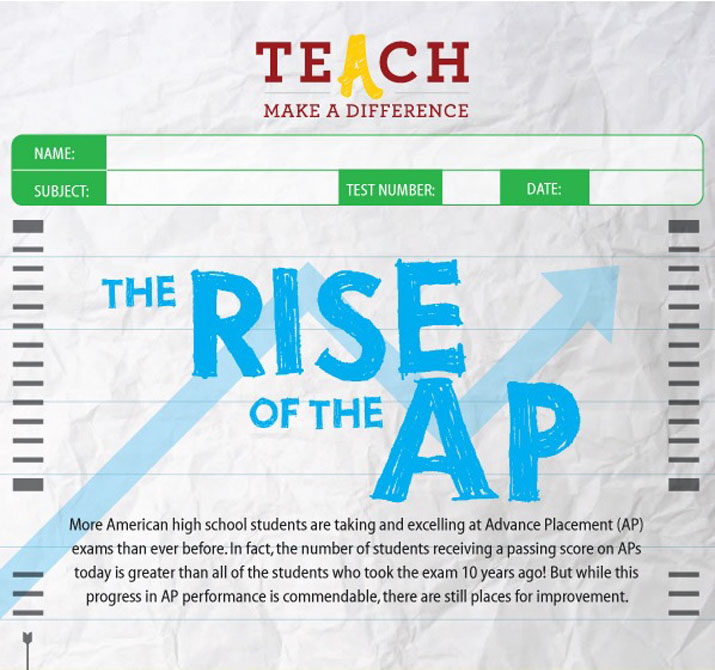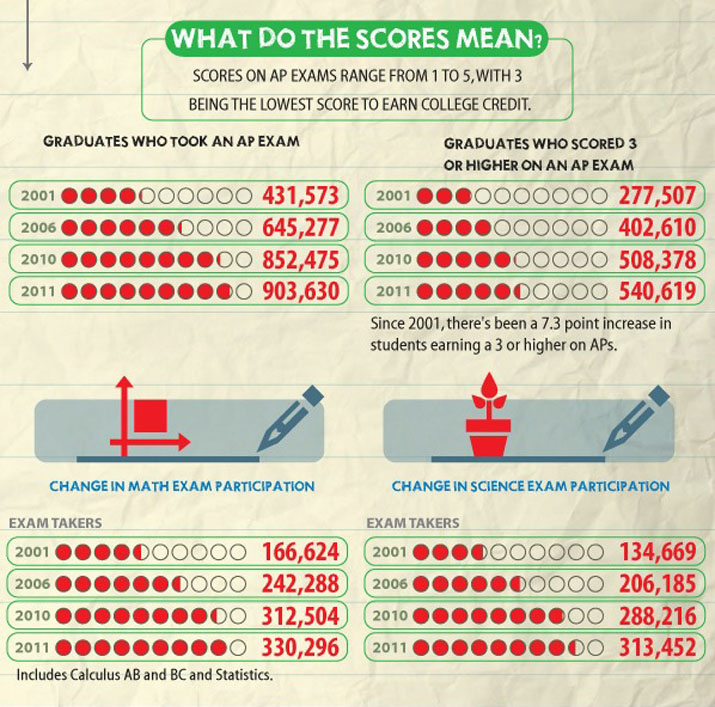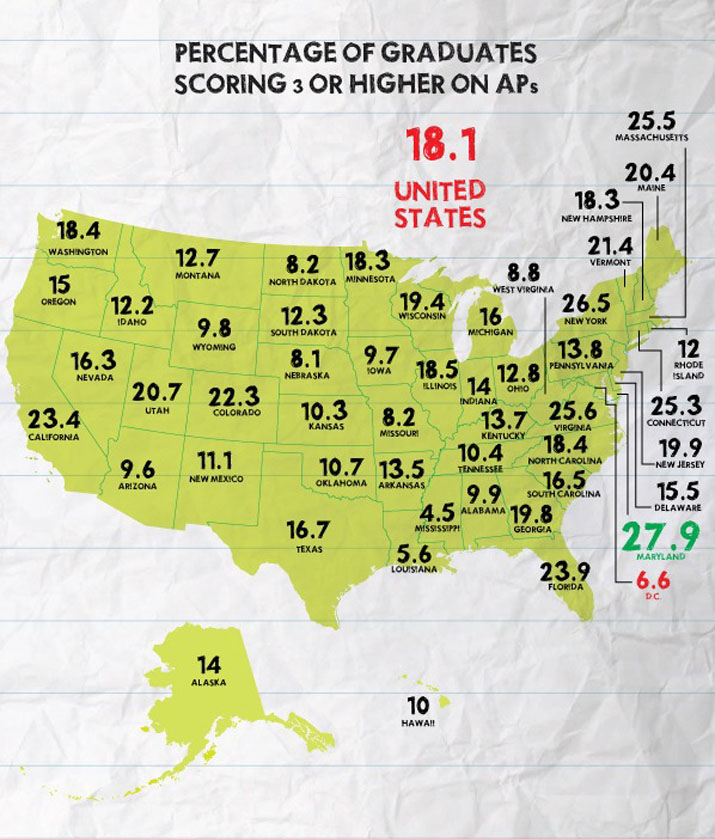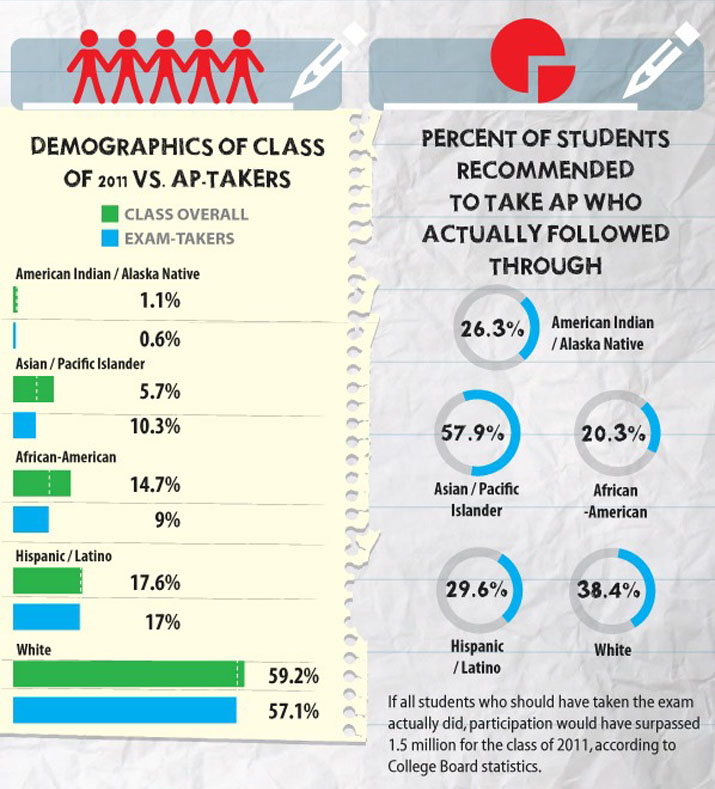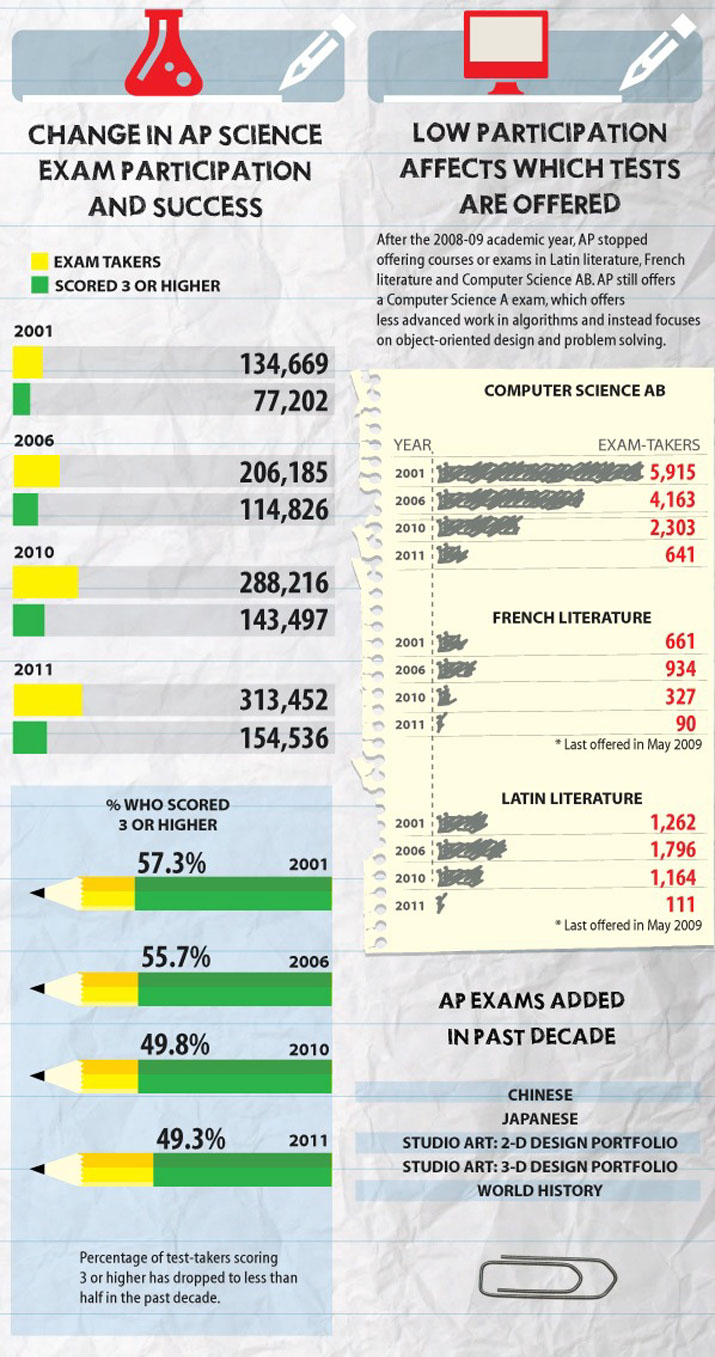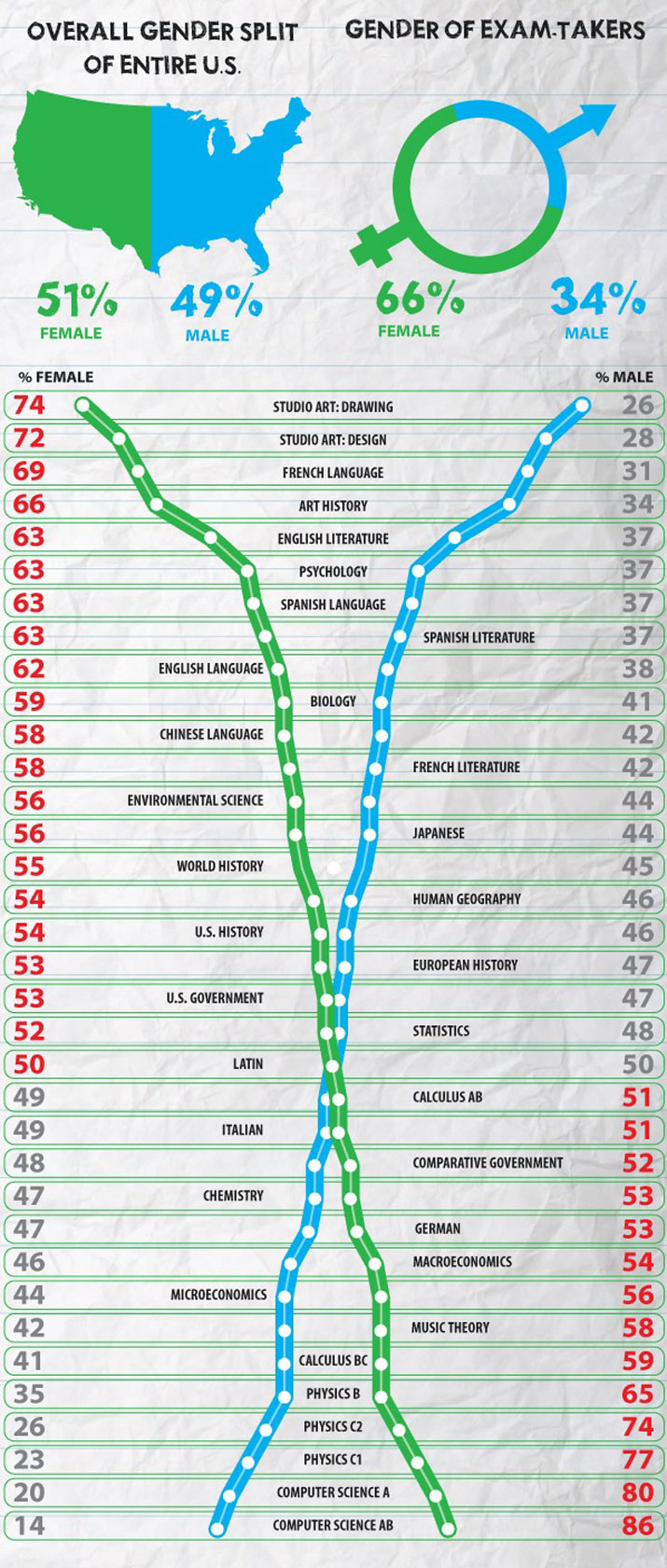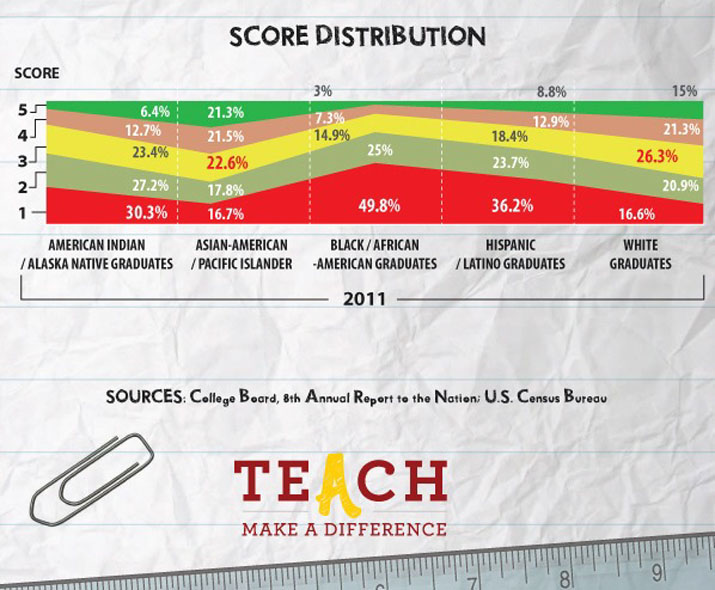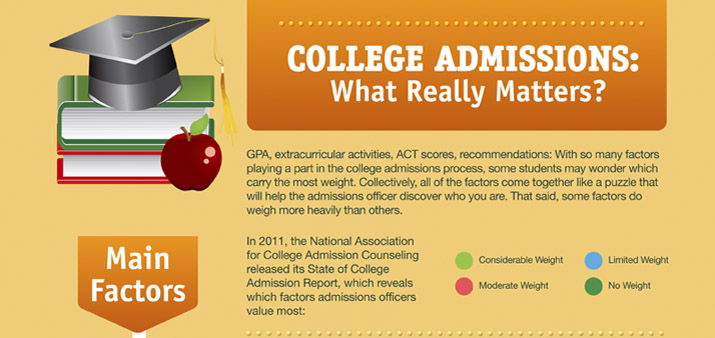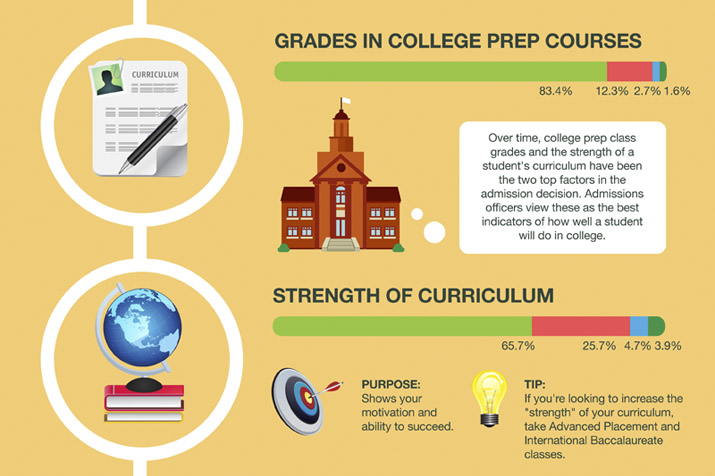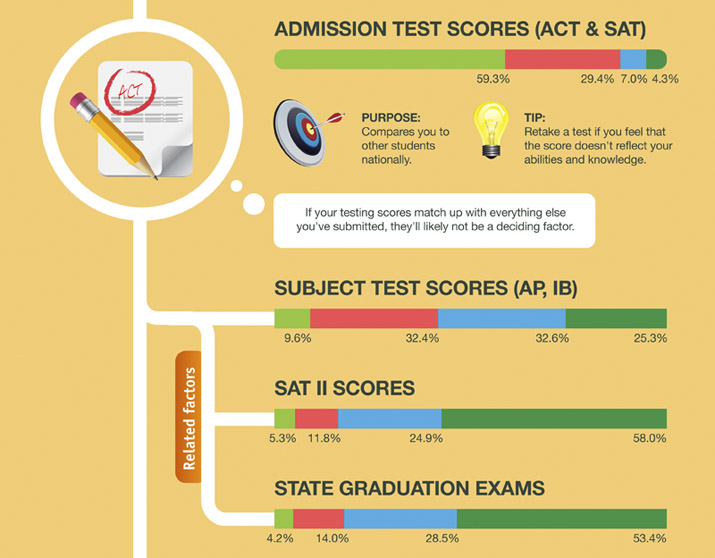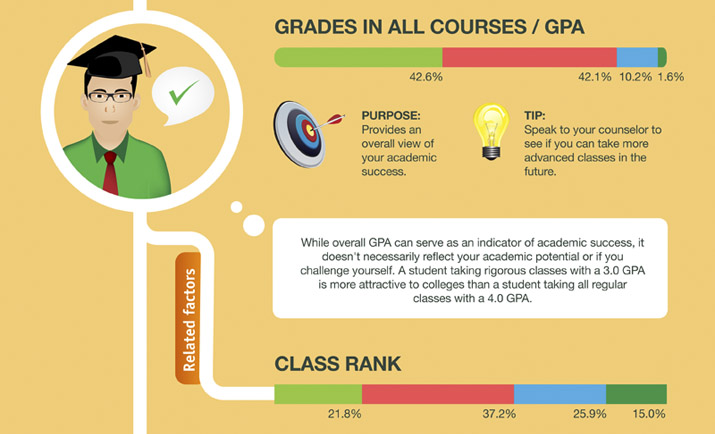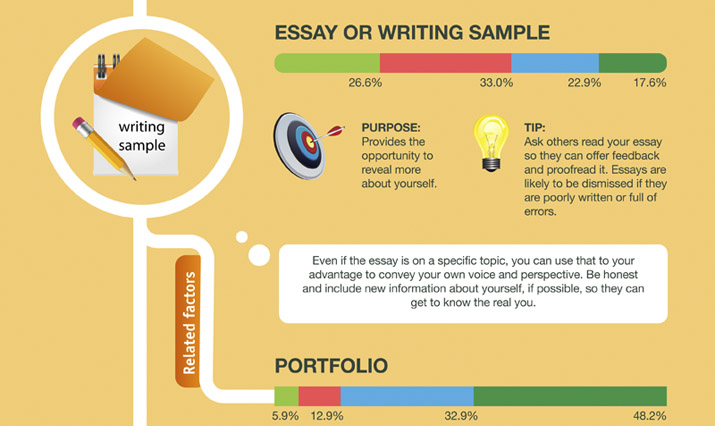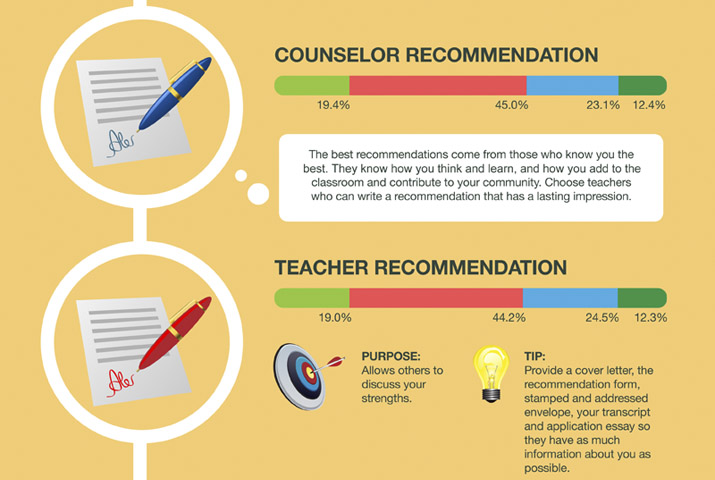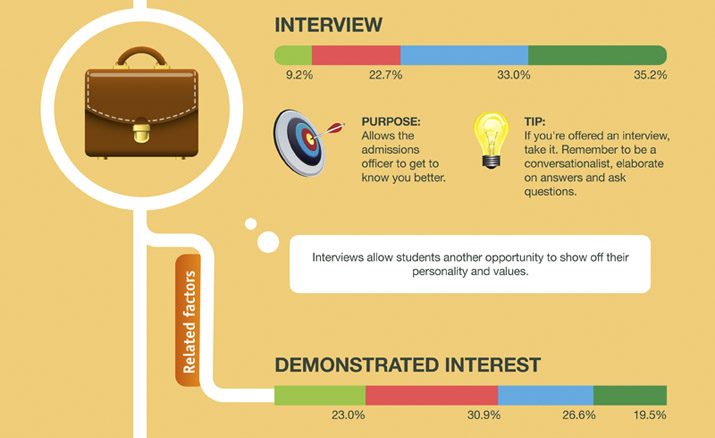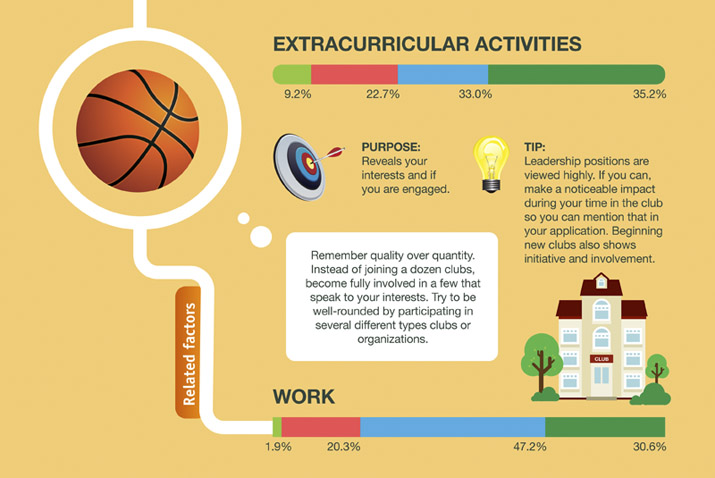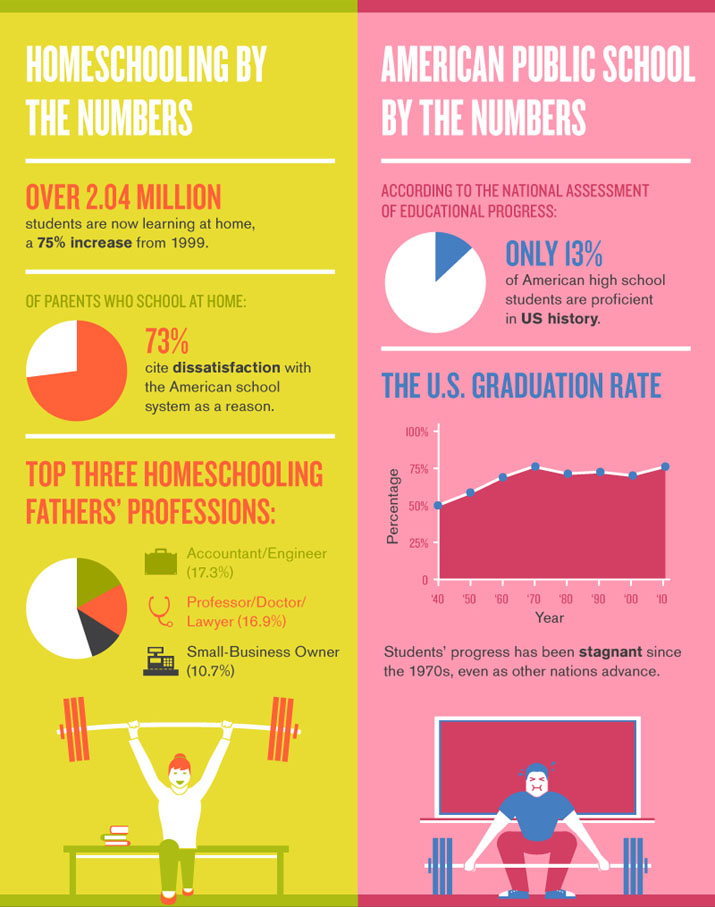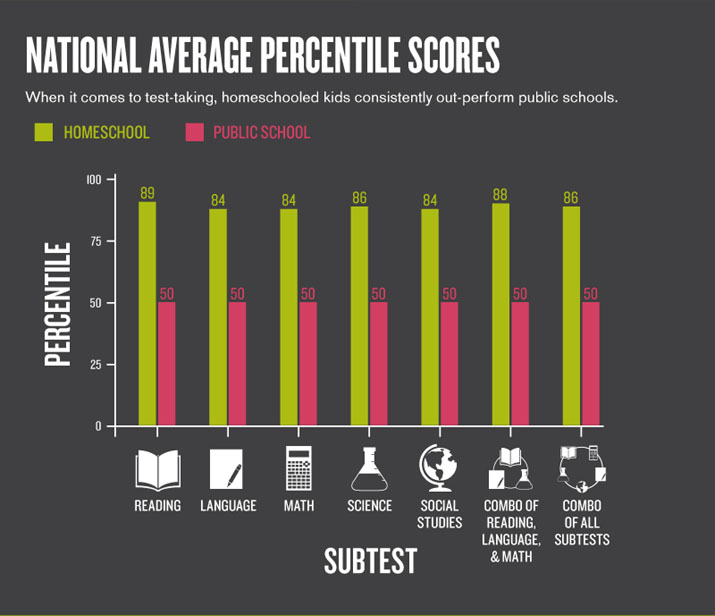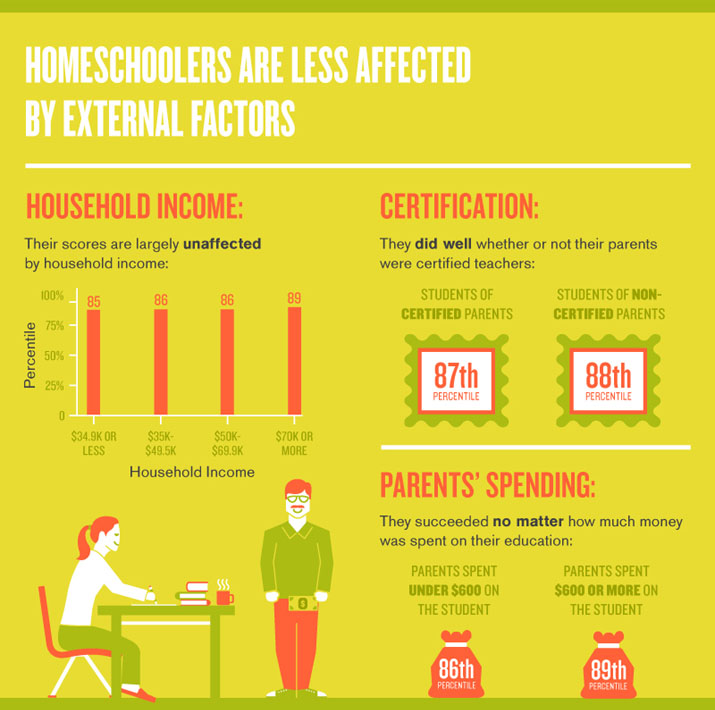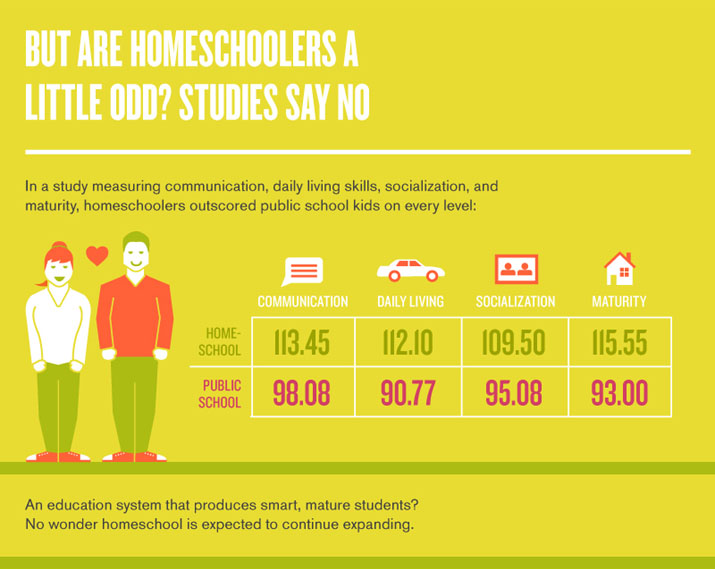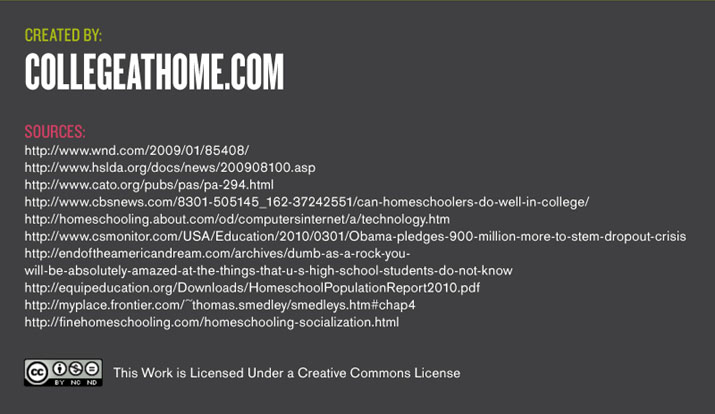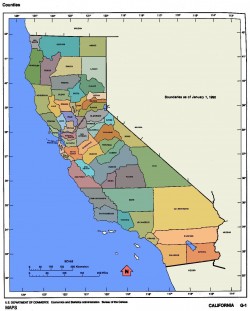Here is a entertaining TED talk video which looks at if public school kills creativity in kids, it is worth a listen and about 20 minutes long. Sir Ken Robinson makes an entertaining and profoundly moving case for creating an education system that nurtures (rather than undermines) creativity.
Category: Homeschool FAQ
As a homeschool parent we may sometimes worries about testing or wonder if AP testing (Advanced Placement Testing) is right for you? Trying to figure out whether it’s worthwhile for your homeschooler to sign up for an Advanced Placement (AP) course or take an AP exam? The infographic below has tons of useful information on who is taking which exams where, and how they are doing.
One of the thing many parents worry about if their child is going to get in to a good college. This worry is common for public school parents and homeschooling parents equally. Here is a infographic showing you what is really matters when it comes to getting in college for kids. It is not only about grades, but also many other factors and activity matters now and some colleges actually do want homeschoolers for their university.
How To Get In Great College or University:
Homeschooling can be serious and fun at the same time. Homeschool humor is someone who is homeshcooler can surely appreciate. Here are true 20 reasons to homeschool is fun way to look at reality of homerschooler family.
Great Reasons You Homeschool:
Here are some highlight reasons to homeschool
- The Only “Gang” your kids belongs to is your Family..
- Teacher Student Ratio is great
- No need for security guards or Metal Detectors
- You can have your birthday as school holiday
- You can sleep on rainy day
- You can wear pajama to class
- You do not know latest fad
- No pressure to buy “back to school” fashion clothes
- Vacation can be extended “field trips”
- You converse with all ages or people, not just plus or minus 6 months to your age
See below for more reasons to homeschool…
Jim Erskine Cartoon via BestHomeschoolBargainEver.com
There are lot of debate on whether public school is better or homeschooling? I guess it is personal opinion, but here is fun info graphic to see in fun image how public school and homeschooling are stacked against each other. You be the judge! As a homeschooling parent, I am bit biased though.
It is always interesting to compare data together and analyze and see what you have chosen comes out at the top. In this info-graphic, there is a comparison between homeschooling kids vs. public school kids and you can see it based on this hightlight facts below;
Homeschooling By Numbers:
Over 2 Millions are homeschooling now : 75% increase since 1999
Top 3 Homeschooling Father’s Profession:
- Engineer/Accountant
- Professor/Doctor/Lawyer
- Small Business Owner
National Average Percentile across Subjects:
- Public school Avg. 50%
- Homeschooling Avg. 86%
GPA Comparisons:
- Public School : FreshMen 3.12, Seniors 3.16
- Homeschooler: FreshMen 3.41, Seniors 3.46
Graduation Rate Comparison:
- Public School: 57.5%
- Homeschooler: 66.7%
If you live in state of California and you may wonder how you can homeschool your children legally and worry free. As any experience homeschooling may know tricks and tips on homeschool laws and support systems but Many new and potential homeschoolers may have questions on how they can homeschool in California. Here are a few ways you can establish and homeschool your child/children legally.
How To Homeschool in California?
Image source: Wikimedia Creative Commons:
There are four ways to legally homeschool your children. First is setting up your own private school, second is PSP also known as Private school Satellite Program, Third is Independent Study program through Public school or Charter school, Finally fourth is credential tutor or teacher. Let’s look at each in more details.
Homeschool Option 1: PSA (Private School Affidavit)
PSA or R4 as it used to be known among homeschool crowd means setting up your own private and personal (only for your kids) school you can educate kids at home via Private School Affidavit. So what does it mean? Lets suppose you have kids enrolled in public school and you withdraw your kids, you set up a private school and ask for school records. As a school, you should be required to keep records of schooling but it is not too difficult and easy to do.
Your private school name and address will be public record when you file PSA, you will just have a as many students as your own school age kids from first grade onwards. Kindergarten is not mandatory in California. You may have answer any inquiry required by state regarding your schooling and may have to teach mandated subjects such as social studies, math, language arts, reading and science.
PSA can be attractive for many homeschoolers as it gives most freedom on education choices, however a few things to note;
- You have choice of how to educate your child, more freedom of choice
- You maintain school records, vaccine records, grades etc
- You spend money as little as or as much you can afford when you have your own school
- As it is very independent, social and support system is must, at least initially to not feel lost
Some people may file PSA through correspondence school, as this option is available.
Homeschool Option 2: PSP : Private School Satellite Program
To simply explain PSP, PSP is private school which has filed affidavit as a school (not as personal family), and when you file PSP with that school, you simply becomes a teacher in that school in sense. Your name and address may not appear in school name but school is required to keep records including such as attendance and school study records which you send to PSP.
Important Things to note for PSP;
- Most of the details and paperwork filed and managed by PSP, you as a teacher to share info on your child’s education
- More support system is provided compared to option 1
- Record keeping and curriculum choices may vary depending on PSP
- Some PSP may offer park days, field trip or newsletter to help parents and kids.
- Parent pays of all tuition and fees for curriculum and educational material
Homeschool Option 3: ISP (Independent Study Program) or Charter School
Many public schools or charter school in California offers ISP Programs, what it means that your child is part of a public school and you will be considered teacher’s aide and assigned a credential teacher to oversee your educating your child for the state required course work and material. You will get to educate your child at home or through professional vendors classes and share records and information needed by ISP or Charter school.
Important Thing to note for ISP or Charter School to know;
- If you are new or planning to homeschool for short span, this option may work the best for you
- school course work can be loaned to you which needs to returned back
- Parent have to sign the agreement to follow California state education rules and star testing
- May offer least or some what restrictive guideline on how to teach your kids, you may have some leeway
- No religious material or religious instruction can be taught during school hours. You can teach off school hours and does not need to be on school records.
Homeschool Option 4: Become a Credential Teacher
As seen in above 3 options, as a parent you do not need to be a credential teacher to teach your OWN kids, however if you get California Teacher or Tutor credentials you can teach your child under private school.
Important thing to note about option 4 is;
- You can teach only the grade you have credential for.
- You can hire credential tutor or teacher to homeschool your child, paying fees from your own pocket.
- School has to be taught between 8 am to 4 pm and school year should have 175 days of school teaching days
- It can get expensive, especially if you hire someone to teach your child or get credential for grade 1-12.
So, now you have all the options in front of you, you can choose one the suite you the best. Once you have more experience as homeschooling parent, you will have more confidence in yourself as a teacher and in your homeschooling.
If you are in California and want to set up your own private school as one of the four options that get started homeschooling your kids legally and right way, here is how to set up and file for PSA (Private School Affidavit) and set up your own private school for your kids to teach. Establishing Your Private School is easy once you know the steps and how to get started on it. Home educators may establish a private school based in their home by filing a Private School Affidavit with the California Department of Education as an option for homeschooling your own children.
Please check out our article on : How to Homeschool in California Article for more choices.
How and When to File the PSA?
One of the easiest way for parent to file for The Private School Affidavit can be online at the California Department of Education website from October 1st to October 15th of every year. You can file any other time during school year, but during Oct 1st through Oct 15th is easiest method. Schools that are created after the filing period should file at the time the school is established every year during these time. The CDE usually leaves the form up until early spring. If you need to file your affidavit and cannot do so electronically (or choose not to), you can still file a Statement in Lieu. We will share soon how to file Statement in Lieu in coming next articles.
If you need a step by step instruction on how to file PSA for California, here is free downloadable link: Step by Step Guide to File PSA
How the PSA Works For Homeschooling?
There is a huge misconception about it, as I was also not sure how it work and how it made it all legal. This is what the information I got from official California Homeschool Website. The Private school affidavit is not a license to private school. The State of California accredits neither public nor private schools if that makes sense. By filing an affidavit you are showing intent to establish a private school, and informing the state, as required by law. Parents have been legally using this provision for many years to conduct their own home-based private schools. So, I know it works and recommended by experts.
What are California Private School Requirements?
According to http://leginfo.ca.gov/, Education Code sections §48222, §48415, §33190, §51210 and §51220 set the criteria for a private school. The following legal requirements apply to all private schools regardless of size:
- The administrator of every private school must file an affidavit with the Superintendent of Public Instruction between October 1st and October 15th of each year.
- Private school instructors must be “capable of teaching.” There is, however, no requirement in the CA Education Code that mandates that teachers in a private school setting hold a state teaching credential or have the equivalent training.
- The names and addresses, including city and street, of the faculty must be kept on file, as must a record of the educational qualifications of each instructor.
- Instruction must be in English.
- Instruction must be offered “in the several branches of study required to be taught in the public schools.” The materials and methods you use to teach these areas are up to you. You are not required to teach every subject as long as it is offered and available to the student:
- Grades 1-6: English, math, social sciences, science, fine arts, health and phys ed.
- Grades 7-12: All that is included in the above plus: foreign language, applied arts, vocational ed and drivers ed.
For information about record keeping for Private schooling records see here: Private Schooling Records (Coming soon!)
Important Things to know about PSA (Private School Affidavit)
- Kindergarten attendance is not mandatory in California. You can teach your child at home but do not fill out PSA for Kindergartener.
- If you are using ISP or Charter school to homeschool, no need to file PSA as it is done by the school itself.
- Some Correspondence school PSP may require filing PSA while other do not. So check with your PSP when in doubt.
- Fingerprinting is not needed when a parent or legal guardian is working with his or her own children.
- State should not be asking more information other that what is listed in California Education §33190.
- If you are part of ISP, PSP, Charterschool program, no need for filing PSA is required.
- Best time to file for PSA is between Oct 1- Oct 15 of every year.
- Do not file for PSA as backup when you have signed in with public school, PSP, ISP or Charter school.
Image Source: 1917 US One Dollar
Financing homeschooling is one of the huge thing to consider when we started homeschooling and you might be wondering the same thing. Public school are free (sort of, we all pay taxes for it, even those of us who homeschool) and private school are just too darn expensive for many people. Here are some suggestions for how to finance your homeschooling supply, text books and field trip.
See: How to homeschool your child for almost Free!
When people talk about teaching their children from home in the absence of any definite or structured curriculum, it is perhaps
natural to think that homeschooling is cheap. But this is far from the truth. Although homeschooling does not stick to any particular
text, this is perhaps more of a bane than a boon, when it comes to finance.
When you need to make sure that your children receives state-of-the-art education so that they can compete with regular
school goers, expenses will naturally mount. The actual cost of educating a child at home is surprisingly high. Up-to-date
textbooks, course materials, a library, computing equipment, lighting, specially designed furniture all cost money. In this
case, the cost may be slightly lesser when it comes to homeschooling the second child. Add to this any additional tuition
cost for tutors who come to teach subjects that cannot be handled by parents, like higher-level math or science. The total cost can
be a bit mind boggling.
If you take another important factor into consideration, homeschooling costs may effective triple. The need for having one
of the parents tied to the house and fully dedicated to providing education deprives the family of a second earning member. The
average homeschooling teacher is usually a lady with a college degree. This means that she can easily bring home a pay of $35,000
or more. It is also interesting to note that most families that have more than 2 children do not opt for homeschooling at all.
But, there are those who have been successful in carrying out homeschooling at low rates. This is dependent on the size of the
family, the support group, the type of materials used and the availability of the material. When successive children can reuse
the materials, cost goes down. Much of the course material can be got from vendors of homeschooling materials. A membership in a
public library, theatre, concerts, ballets and other cultural events also help in cutting costs. Sometimes, it is even possible
to barter expertise. For instance, the mother of an 8-year old gives dancing classes, and her daughter receives drawing classes
for free. Support groups allow you to divide the cost of field trips, science projects and fairs.
Whatever the cost, advocates of homeschooling say that the benefits far outweigh these considerations. When you are able to
decide what knowledge your child receives and when he or she should be taught and to what extent, it gives you a lot of freedom
and a lot of power. Both the children as well as the parents benefit from this mutually enriching experience.
Check out:
10 Things to Consider Before you Start Homeschooling
Homeschool Reference Books for Parents
Best early education homeschool curriculum
Best kindergarten curriculum I love! Sing, Spell, Read and Write
Homeschooling could be the most feasible option for parents who want to educate their children but cannot afford the expenses in a typical school. The Best Information on Home Schooling is important to make right choice that works for you, child and your family.
With homeschooling, parents can still have the best education for their children without having to resort to expensive everyday expenditures of sending children to school.
However, one should bear in mind that homeschooling is not for everybody, and not all homeschool curriculum are appropriate for everyone.
Learning through homeschooling may differ from one person to another. This is because in homeschooling; the traditional aspects of learning are not present like the typical classroom setting, the fixed schedules, etc. This goes to show that parents may opt to change the program in order to fit the needs of their children.
In homeschooling, the parents are the ones who teach their children. They just have to buy a particular homeschooling curriculum that they think would best work for them. In this way, the parents are able to educate their children on their own free will and without the influence of a typical “school system”.
With its many advantages, homeschooling is now recognized as a legal educational system in all of the states in the U.S., though each state has its own set of rules and regulations regarding what and how homeschooling should be executed. To find out your local homeschooling information, check out our: Homeschooling Resource page.
However, many people question the reliability and efficiency of homeschooling. Many are still wondering whether children can really learn form this type of education. Statistics show that students who had their basic education from homeschooling, were able to do very well in college.
Most experts contend that the data and the assertions are true because with homeschooling, the parent-child relationship is a very effective tool in educating an individual. This is because children in a homeschooling program are less pressured and less tensed because it is their parents who do the teaching and not somebody else; therefore, the inhibition is lessened.
In this manner, learning is more interactive, more comprehensive, and more properly initiated as long as there is a good curriculum that will serve as a guide.
In order to know more information about homeschooling programs in your community, it is best that you consult your state’s laws on homeschooling. Each state has its own set of rules, hence, what may work for one state may not be applicable to the other states.
Just keep in mind that it is important that you and your child are comfortable with the program in order to make homeschooling effective.
See also:
Buy educational Toys that boost child’s creativity
10 Things to Consider Before you Start Homeschooling
Homeschool Reference Books for Parents
Best kindergarten curriculum I love! Sing, Spell, Read and Write
This is 2 Parts series document on detailed guide to how to unschool: To see second part of the series, see How to unschool Part 2.
I have written about it before on the blog How to Unschool your child and Guide to Homeschooling Methods.
By Leo Babauta:
There’s nothing I get asked about more as a parent than unschooling, and nothing I recommend more to other parents.
It’s an educational philosophy that provides for more freedom than any other learning method, and prepares kids for an uncertain and rapidly changing future better than anything else I know. My wife and I unschool four of our kids, and have been for several years.
And yet, as powerful as I believe unschooling to be, I’ve never written about it, because the truth is, I certainly don’t have all the answers. No one does.
The beauty of unschooling is in the search for the answers. If anyone had all the answers, there would be no search. And so what I’d love to teach unschooling parents and kids is that the search is the joy of it all.
But I’m getting ahead of myself: what is unschooling? Why should you do it? How do you do it? What should you read? We’ll talk about all that today.
What is Unschooling?
First, it’s a form of homeschooling. But there’s no easy answer to that except in comparison to regular schooling. There’s no one way to do unschooling, and people who do it often do it for many different reasons in many different ways.
However, this is how I describe it — in contrast to school:
- While school has classes with subjects, unschooling doesn’t.
- While school has goals set by teachers and the school system, the unschooler (the kid) set his or her own goals.
- While in school, knowledge is handed down from the teacher to the student, in unschooling the student is empowered to learn for himself.
- While school has specific books or sets of learning materials, unschoolers can learn from anything — books they find, things on the Internet, siblings or parents, the outdoors, museums, people working in interesting fields, anything.
- While school is structured, unschooling is like jazz. It’s done on the fly, changing as the student changes.
- While students in school learn to follow instructions, unschoolers learn to think for themselves and make their own decisions.
- While students in school are asked to learn at pace arbitrarily set by administrators, unschoolers learn at their own pace.
- While in school, learning happens in the classroom at certain times, in unschooling learning happens all the time, and there is no division between learning and life.
Let me emphasize that for a minute: in unschooling, life itself is learning. There is no “doing school” … you are learning all the time.
Unschoolers learn just like you or I learn as adults: based on what interests them, figuring out how to learn it on their own, changing as they change, using whatever resources and learning materials they find, driven by curiosity and practical application rather than because someone says it’s important.
This is how I learn as a self-employed writer, as an entrepreneur, as a parent. It’s how our children will learn when they’re adults. Why not have them learn like that now?
Why Unschool?
Let’s think about what school is about: preparing kids for jobs (and life) in the future … a future that’s probably a decade or more away. Now think about a decade or more of change: how many of us predicted 13 years ago what life would be like today? Did we know about the economic recession, or the changing job market, or the fact that things like smartphones and iPads and ebook readers would be so widespread? And that’s just the start.
If we can’t predict what our kids’ future will be like, how can we decide today what they should be learning to prepare for that future? We’re preparing them for today’s jobs, not tomorrow’s jobs. School teaches kids a set of facts and skills that they might not need in the future.
Unschooling takes a different approach: kids learn how to learn, how to teach themselves. If you know how to learn and how to teach yourself, then you are prepared for any future. If in the future the things we know are obsolete, then the person who knows how to learn anything will be ready to learn whatever is in use in the future. The person who only knows how to learn from a teacher will need a teacher to teach him.
More reasons to unschool:
- It’s how entrepreneurs learn. Schools prepare kids to follow instructions, like good employees, while entrepreneurs take charge of what they need to know and make decisions for themselves, navigate through uncharted waters. Unschooling prepares kids to be entrepreneurs instead of robots.
- It’s much more natural. The school system is a fairly modern invention, and isn’t how humans have learned for the majority of our history. Unschooling is the learning method used for most of human history — including by people like Leonardo Da Vinci, Leo Tolstoy, Mozart, Einstein and Benjamin Franklin.
- It’s freer. The structure of school is good for people who like decisions made for them, but if you like making your own decisions, and figuring out things based on current needs, you will want more freedom.
- We learn with the kids. While in school, many parents are removed from the learning process, and ask the teachers to take responsibility for their kids’ education, with unschooling you learn with your kids. The most important learning I’ve been doing is learning about learning. We figure out, together, how people learn, what’s the best way to learn, for each kid.
- Learning is unlimited. In school, learning is limited to the classroom and homework time. Then kids believe they stop learning and they can go play and live life — as if learning is boring and they only do it because they’re forced to. But unschoolers learn that learning happens all day long, every day, no matter what you’re doing. If you’re not studying a textbook, does that mean you’re not learning? Can’t you learn from playing games, going for a hike, talking to strangers? How about from figuring out how to cook dinner, or fix a broken faucet, or make a fort? Learning is all around us, and it’s fun! That’s what unschooling teaches us.
- You can find out more about unschooling here.
Source: Zenhabits.net
